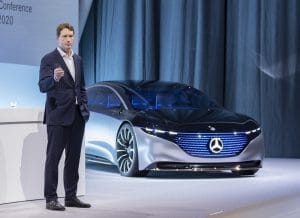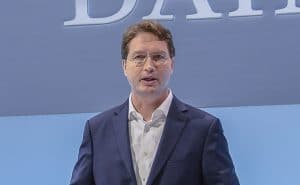Daimler AG CEO Ola Källenius didn’t wait long to implement his newest plan to use further headcount reductions to help bring the German company’s profitability back up to expected levels — and he’s starting at the top.
Källenius, who also instituted staff cuts when he took over for Dieter Zetsche last May, said more changes would be necessary during the company’s meeting for its full-year earnings report nearly two weeks ago.
The company, which produces Mercedes-Benz automobiles and vans, is assigning management of the brand’s finance, production and development responsibilities to Daimler executes and eliminating the now-redundant positions.
(Despite Mercedes sales record, Daimler’s 2019 profits take massive hit.)

Källenius said the company will continue to focus on cost cutting measures as it tries to move back to previous profit levels several days ago.
In fact, Källenius is not just talking the talk, he’s walking the walk by over responsibility for Mercedes Vans from Wilfried Porth, who retains his role as head of human resources. Other changes include Daimler’s Chief Financial Officer Harald Wilhelm will take over responsibility as finance chief at Mercedes-Benz AG from April 1 and Mercedes-Benz Chief Financial Officer Frank Lindenberg will leave, the company said.
Wolf-Dieter Kurz will take on responsibility for product strategy and steering at Mercedes-Benz Cars. He is currently responsible for the business cases of product projects. Markus Schaefer, currently management board member for Research and Mercedes-Benz Cars development, will become chief operating officer at Daimler AG, the Stuttgart-based company said.
“Acting today to be fit for tomorrow’s global competition — that was our premise for the further development of the company’s organizational structure,” said Manfred Bischoff, Chairman of the Supervisory Board of Daimler AG, in a statement.
(Daimler plans major job losses to offset coming expenses.)
“To emerge successfully from the transformation, we welcome the streamlining of the organizational and management structure proposed by the Board of Management. All activities focus on
future proofing and improving our financial strength, as that is the basis of a sustainable business strategy. The Supervisory Board is convinced this new structure means that the company will be even better positioned to face the challenges of the future in a highly volatile environment.”
The move to cut costs comes despite its Mercedes-Benz luxury car unit setting a new sales record in 2019. Daimler AG reported a 64% drop in full-year profits to 2.7 billion euros, or $2.9 billion, from 7.6 billion euros, or $7.8 billion, in 2018.
Much of the nearly 5 billion-euro decline can be traced to 4.2 billion in charges the company took due to diesel-related investigations and the legal costs associated with it. Additionally, the company spent heavily on its move toward electric vehicles.
(Rising diesel costs help cut Daimler profits in half.)
The company saw its revenues increase to 172.7 billion euros from 167.4 billion euros – a 3% jump. However, it wasn’t enough to offset the aforementioned penalties the German company was forced to absorb. Even with the changes, Daimler officials issued a forecast that said 2020 would likely be a repeat of 2019 and that the impact of the changes would come later.


